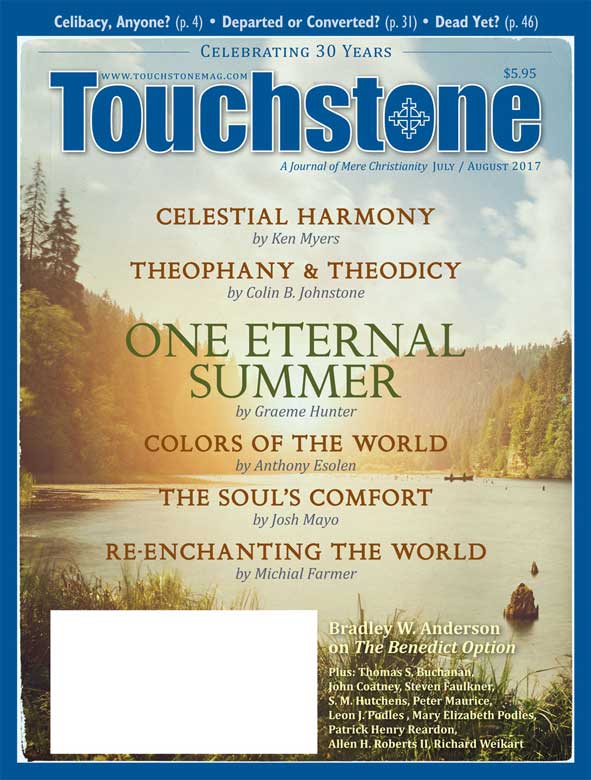Mortal Remains
Education in
Pen State
by S. M. Hutchens
It has been statistically noted that if a person is not secured in faith when he is young, as he ages his chances for coming to Christian belief are lower. This is natural, for people are more likely to seek and confirm themselves in causes for life at its opening stages than at more advanced age, when large beginnings become more difficult in many ways. Youth, also, is marked by ignorance and enthusiasm, which are allies in devoting life to any view or cause, worthy or not. The question for authentic Christian life, as the Lord taught in the Parable of the Sower, then becomes whether there is growth in understanding, conviction, and activity—a deepening root that sustains spiritual life through trials and difficulties.
There is, however, advantage in later life, if life is granted, for those who have early chosen poorly—opportunities for turning around. (I cannot help thinking of Tom Oden here.) There has been time for the trial of poor choices in the court of a more developed mind.
The saeculum plays upon the desires of youth to be untrammelled, encouraging in the inexperienced the illusion of liberty, of freer ground and air outside the restrictions of "religion." Christ answers this by identifying himself as the Master whose yoke is easy and whose burden is light, who (despite the presentations of false evangelists) offers no escape from real life, but a way to live fruitfully and hopefully within it. The wise youth hears him and shoulders this yoke, but this is not what his liberty-seeking brother desires. The contrarian puts on his own encumbering predispositions and goes in search of a better master.
This is the story of the Prodigal Son, who, exhausting the capital he has taken from his father's house, hires himself out to work for a citizen of a far country and grows older attempting to digest the philosophical, ideological, moral, aesthetic, and religious provender of infidels. He reflects that all this has not made him satisfied, hopeful, or happy, and that something better is out there, which he has been too proud to accept because acceptance stood in the way of his quest for what he once identified as free and happy self-actualization.
The elect prodigal thus schooled by the world finds himself becoming open to the thought that people who have accepted the Yoke are not stupid, as he once wanted so desperately to think, but have found the better way. He has discovered empirically that the pen is not his natural home, husks are not his natural food, and as much as he has tried, he cannot bring himself to enjoy the tastes and diversions of swinish companions. His has been a life of disappointed experimentation, and in this admission his mind turns to those who are living yoked but satisfied, under what he once thought of as the intolerable confinement of faith in God.
This unhappy life is a gift from God to those who were proud, headstrong, and unwise in their youth. They have been given the opportunity to see and taste, husk by dry, hard, tasteless husk, what they have chosen. They may be in many respects the superiors of those of us who have remained in the father's house, because in their years of husk-chewing they have learned some things worth knowing. To prepare for their return, we must look for them, and be ready to give them welcome.
S. M. Hutchens is a senior editor and longtime writer for Touchstone.
subscription options
Order
Print/Online Subscription

Get six issues (one year) of Touchstone PLUS full online access including pdf downloads for only $39.95. That's only $3.34 per month!
Order
Online Only
Subscription

Get a one-year full-access subscription to the Touchstone online archives for only $19.95. That's only $1.66 per month!
bulk subscriptions
Order Touchstone subscriptions in bulk and save $10 per sub! Each subscription includes 6 issues of Touchstone plus full online access to touchstonemag.com—including archives, videos, and pdf downloads of recent issues for only $29.95 each! Great for churches or study groups.
Transactions will be processed on a secure server.
more on conversion from the online archives
more from the online archives
calling all readers
Please Donate
"There are magazines worth reading but few worth saving . . . Touchstone is just such a magazine."
—Alice von Hildebrand
"Here we do not concede one square millimeter of territory to falsehood, folly, contemporary sentimentality, or fashion. We speak the truth, and let God be our judge. . . . Touchstone is the one committedly Christian conservative journal."
—Anthony Esolen, Touchstone senior editor











